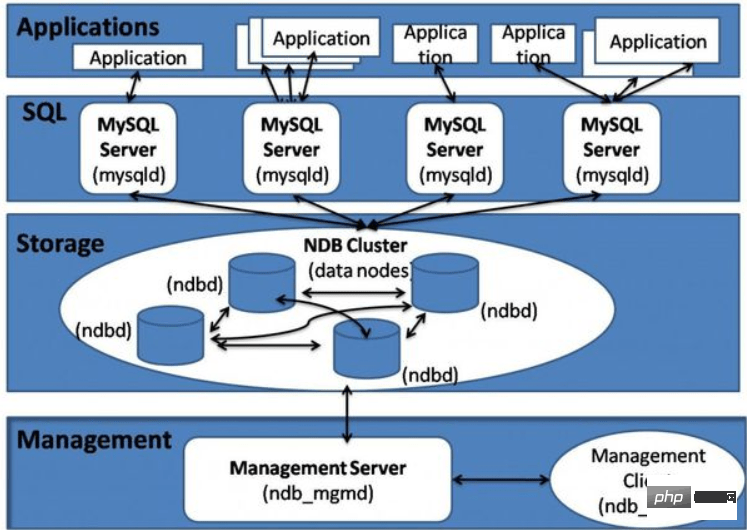The difference between mysql cluster and master-slave
The difference between the cluster and the master-slave in mysql: the master-slave ensures data consistency through mysql replication; it is asynchronous compared to the data synchronization method of the mysql cluster. Because it is asynchronous, there may be a slight delay in copying data between the master and the slave, and inconsistencies may occur.

Recommended course: MySQL Tutorial.
The master and slave use mysql replication to ensure data consistency. Compared with the data synchronization method of mysql cluster, it is asynchronous.
The cluster uses PXC (Percona XtraDB Cluster), multi-node data is synchronized in real time (read and write)
About master-slave
Master-slave can ensure the separation of reading and writing, that is, the writing operation is on the master and the reading operation is on the slave. There are also multiple master-slave modes. Here we only talk about one master and multiple slaves.
For example, there are two business modules. One module continuously writes order records, etc., and the other module generates reports. If read and write separation is not adopted at this time, the read and write operations will collide, which may cause conflicts and affect Performance, if reading and writing are separated, there is no need to consider reading and writing the same table to affect performance, and multiple slaves can well share the pressure on the server and reduce the pressure on a single machine.
The master-slave uses replication of mysql to ensure data consistency. Compared with the data synchronization method of the cluster, it is asynchronous. Because of asynchronous, there may be a slight delay in copying data between the master and the slave. Delay, and inconsistencies will occur.

Replication: The master node needs to enable binlog, set a unique server-id (unique within the local area network), set the server-id from the slave node, and the binlog records all the messages on the master. The operation will be copied to the relaylog of the slave node and played back on the slave node.
But the master-slave also has shortcomings. One is that it does not meet high availability. The master is down and needs to be switched manually. The business will be interrupted and is not allowed.
The other is that the data is inconsistent and inconsistent. There are many possible reasons. The following are some common ones.
The master library or slave library unexpectedly crashes. The downtime may cause damage to the binlog or relaylog files, resulting in master-slave inconsistency. (There is an article in this blog, which was fixed after the downtime)
If set sql_log_bin=0 is executed before the main library performs changes, the main library will not record the binlog, and the slave library cannot change this. Part of the data
The binlog format of the main library is Statement. After synchronization to the slave library, it may cause inconsistency between the master and the slave.
The slave node is not set to read-only , write data by mistake
The versions of the master and slave instances are inconsistent, especially when the higher version is the master and the lower version is the slave, the functions supported by the master database may not be supported by the slave database. This function is not supported
MySql BUG
Then you need to pay attention to the following matters when using it
-
The main library binlog adopts ROW format
The master and slave instance database versions are consistent
The main library controls the account permissions. You can execute set sql_log_bin=0
The slave library turns on read-only and does not allow manual writing
Perform master-slave consistency check on a regular basis
About the cluster
The biggest advantage of the cluster is real-time data synchronization, high availability, and the data of each node is synchronized Consistent, unlike master-slave, where data inconsistency sometimes occurs, and high availability, any node downtime will not affect the business.
But the disadvantage is performance, write performance. Each write operation will be synchronized between all nodes. There are gains and losses, and a little performance is lost to ensure high availability and data consistency.
In the cluster, there is one management node and multiple SQL nodes and data nodes. Synchronous replication is used between data nodes to ensure data consistency between nodes. Generally, it is submitted through two stages. The general working process is as follows
When the Master executes the commit statement, the transaction is sent to the slave, and the slave begins to prepare for the submission of the transaction
Each slave must prepare the transaction and then send an OK (or ABORT) message to the master, indicating that the transaction is ready (or the transaction cannot be prepared)
Master waits for all slaves to send OK or ABORT message
If the Master receives OK messages from all Slave, it will send a commit message to all Slave, telling the Slave to submit the transaction;
If the Master receives ABORT message from any Slave, it sends ABORT message to all Slave, telling the Slave to abort the transaction.
Each Slave waits for an OK or ABORT message from the Master
If the Slave receives a commit request, they will commit the transaction and send it to Master sends a confirmation that the transaction has been committed;
If the Slave receives a cancellation request, they will undo all changes and release the resources they occupy, thereby aborting the transaction, and then send a confirmation that the transaction has been aborted to Masterv.
When the Master receives confirmation from all Slaves, it will report that the transaction has been committed (or aborted), and then continue with the next transaction
Since synchronous replication requires a total of 4 message transfers, the data update speed of mysql cluster is slower than that of stand-alone mysql. Therefore, mysql cluster is required to run in a LAN of Gigabit or above. The nodes can use dual network cards, and the node groups are directly connected to ensure the data update speed.

The above is the detailed content of The difference between mysql cluster and master-slave. For more information, please follow other related articles on the PHP Chinese website!

Hot AI Tools

Undresser.AI Undress
AI-powered app for creating realistic nude photos

AI Clothes Remover
Online AI tool for removing clothes from photos.

Undress AI Tool
Undress images for free

Clothoff.io
AI clothes remover

AI Hentai Generator
Generate AI Hentai for free.

Hot Article

Hot Tools

Notepad++7.3.1
Easy-to-use and free code editor

SublimeText3 Chinese version
Chinese version, very easy to use

Zend Studio 13.0.1
Powerful PHP integrated development environment

Dreamweaver CS6
Visual web development tools

SublimeText3 Mac version
God-level code editing software (SublimeText3)

Hot Topics
 1377
1377
 52
52
 MySQL: The Ease of Data Management for Beginners
Apr 09, 2025 am 12:07 AM
MySQL: The Ease of Data Management for Beginners
Apr 09, 2025 am 12:07 AM
MySQL is suitable for beginners because it is simple to install, powerful and easy to manage data. 1. Simple installation and configuration, suitable for a variety of operating systems. 2. Support basic operations such as creating databases and tables, inserting, querying, updating and deleting data. 3. Provide advanced functions such as JOIN operations and subqueries. 4. Performance can be improved through indexing, query optimization and table partitioning. 5. Support backup, recovery and security measures to ensure data security and consistency.
 Can I retrieve the database password in Navicat?
Apr 08, 2025 pm 09:51 PM
Can I retrieve the database password in Navicat?
Apr 08, 2025 pm 09:51 PM
Navicat itself does not store the database password, and can only retrieve the encrypted password. Solution: 1. Check the password manager; 2. Check Navicat's "Remember Password" function; 3. Reset the database password; 4. Contact the database administrator.
 How to create navicat premium
Apr 09, 2025 am 07:09 AM
How to create navicat premium
Apr 09, 2025 am 07:09 AM
Create a database using Navicat Premium: Connect to the database server and enter the connection parameters. Right-click on the server and select Create Database. Enter the name of the new database and the specified character set and collation. Connect to the new database and create the table in the Object Browser. Right-click on the table and select Insert Data to insert the data.
 MySQL: Simple Concepts for Easy Learning
Apr 10, 2025 am 09:29 AM
MySQL: Simple Concepts for Easy Learning
Apr 10, 2025 am 09:29 AM
MySQL is an open source relational database management system. 1) Create database and tables: Use the CREATEDATABASE and CREATETABLE commands. 2) Basic operations: INSERT, UPDATE, DELETE and SELECT. 3) Advanced operations: JOIN, subquery and transaction processing. 4) Debugging skills: Check syntax, data type and permissions. 5) Optimization suggestions: Use indexes, avoid SELECT* and use transactions.
 MySQL and SQL: Essential Skills for Developers
Apr 10, 2025 am 09:30 AM
MySQL and SQL: Essential Skills for Developers
Apr 10, 2025 am 09:30 AM
MySQL and SQL are essential skills for developers. 1.MySQL is an open source relational database management system, and SQL is the standard language used to manage and operate databases. 2.MySQL supports multiple storage engines through efficient data storage and retrieval functions, and SQL completes complex data operations through simple statements. 3. Examples of usage include basic queries and advanced queries, such as filtering and sorting by condition. 4. Common errors include syntax errors and performance issues, which can be optimized by checking SQL statements and using EXPLAIN commands. 5. Performance optimization techniques include using indexes, avoiding full table scanning, optimizing JOIN operations and improving code readability.
 How to create a new connection to mysql in navicat
Apr 09, 2025 am 07:21 AM
How to create a new connection to mysql in navicat
Apr 09, 2025 am 07:21 AM
You can create a new MySQL connection in Navicat by following the steps: Open the application and select New Connection (Ctrl N). Select "MySQL" as the connection type. Enter the hostname/IP address, port, username, and password. (Optional) Configure advanced options. Save the connection and enter the connection name.
 How to open phpmyadmin
Apr 10, 2025 pm 10:51 PM
How to open phpmyadmin
Apr 10, 2025 pm 10:51 PM
You can open phpMyAdmin through the following steps: 1. Log in to the website control panel; 2. Find and click the phpMyAdmin icon; 3. Enter MySQL credentials; 4. Click "Login".
 How to execute sql in navicat
Apr 08, 2025 pm 11:42 PM
How to execute sql in navicat
Apr 08, 2025 pm 11:42 PM
Steps to perform SQL in Navicat: Connect to the database. Create a SQL Editor window. Write SQL queries or scripts. Click the Run button to execute a query or script. View the results (if the query is executed).




